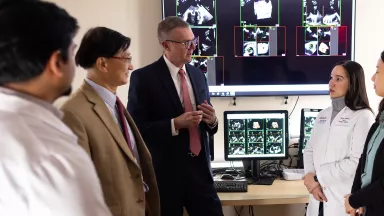Endocarditis
At the Montefiore Einstein Center for Heart and Vascular Care, you can access exceptional care for endocarditis. As a global leader in cardiovascular medicine and surgery, we are an academic-based, national and international referral site for high-risk and complex cases. For more than a century, we have been at the forefront in treating heart disease.
Ranked in the top one percent of all hospitals in the nation for Cardiology, Heart & Vascular Surgery according to U.S. News & World Report, our specialists are passionate about uncovering the latest diagnostic approaches and treatments that can improve outcomes. Backed by a multidisciplinary team of specialists, Montefiore Einstein continues to make advances in the treatment of heart disease. In recent years, we have expanded our programs in advanced cardiac imaging, heart failure and interventional cardiovascular medicine and assembled a world-renowned cardiothoracic surgical team.
When you trust us with your care, you can expect compassionate, personalized treatment plans that meet the highest standards for quality and safety. In addition, we offer patients a full choice of support services, from nutritional guidance to rehabilitative therapies.
When you need endocarditis care, turn to our dedicated providers who will develop a highly personalized treatment plan specific to you.
As part of an academic health system, Montefiore Einstein Center for Heart and Vascular Care supports the mission and guidelines of the U.S. Department of Health and Human Services (HHS). The following information is provided by HHS.
Heart Inflammation Risk Factors
You may have an increased risk for heart inflammation such as endocarditis, myocarditis, and pericarditis because of your age, sex, Genetic , environment, lifestyle, or medical conditions and procedures.
Age
Different age groups are at risk for different types of heart inflammation:
- Although they can affect all ages, myocarditis and pericarditis occur more often in young adults. Pericarditis also commonly affects middle-aged adults.
- Older adults are more at risk for endocarditis caused by bacteria. In recent years, age-related heart valve infections have been on the rise.
Sex
Heart inflammation from endocarditis, myocarditis, and pericarditis is more common in men than in women, except when caused by autoimmune diseases, such as lupus and rheumatoid arthritis, which are more common in women.
Endocarditis and pericarditis occur twice as often in men as in women.
Genetics
Genetics play a role in the risk of developing all three types of heart inflammation. Your genes may be partly responsible for how your body responds to infection and inflammation and whether you develop myocarditis or pericarditis.
People who have structural or congenital heart defects, such as problems with the heart valves, may be at higher risk for infection that can cause endocarditis.
Certain inherited conditions can affect your risk for heart inflammation. For example, you may be at higher risk for myocarditis and pericarditis if you have familial Mediterranean fever or tumor necrosis factor receptor-associated periodic syndrome (TRAPS). These rare conditions affect how the body controls inflammation.
Environment
Chagas disease, common in Latin America, can cause acute and chronic myocarditis. It is caused by a parasite that is spread by certain types of insects. Endocarditis caused by Streptococcus bacteria is more common in less developed countries.
Lifestyle choices
Certain lifestyle choices raise your risk for endocarditis or myocarditis. These include:
- Drinking too much alcohol, which may cause inflammation of the myocardium and could lead to reduced heart function and heart failure
- Drug use such as cocaine and amphetamines and intravenous drug use with endocarditis
- Poor dental health, which increases the risk for bacterial endocarditis
Medical conditions
Some medical conditions can increase your risk of endocarditis, myocarditis, or pericarditis. These include:
- Cancers, such as advanced lung and breast cancer or lymphoma. Medicines used to treat these types of cancer can cause myocarditis or pericarditis.
- Diabetes, which can make you more likely to develop infections
- Eating disorders such as anorexia
- End-stage kidney disease, which can result from the buildup of waste products in the blood
- HIV/AIDS, which may lead to myocarditis from a number of causes, including viral, bacterial, or fungal infection; treatment; and nutritional deficiencies. People who have HIV/AIDS may be at higher risk for fungal infection.
- Skin disorders, such as burns or recurrent infections
- Trauma or injury to the chest or esophagus, or indirect injury to the chest wall
Medical procedures
Certain medical procedures can increase your risk of endocarditis, myocarditis, or pericarditis, including:
- Central venous line, which is an intravenous catheter that goes into a larger central vein in your body
- Devices in the heart, such as artificial heart valves, pacemakers, and implantable cardioverter defibrillators
- Hemodialysis for end-stage kidney disease. Infection may result from access to blood vessels needed for hemodialysis.
- Medical procedures, such as having a central venous line, which is an intravenous catheter that goes into a larger central vein in your body; heart ablation for abnormal heart rhythm; or treatments for coronary heart disease
- Radiation therapy to treat cancers such as lung and breast cancer and lymphoma. This may cause myocarditis or pericarditis.
- Treatments for ischemic heart disease
Syndicated Content Details:
Source URL: https://www.nhlbi.nih.gov/subscribe/86004
Source Agency: National Heart, Lung, and Blood Institute (NHLBI)
Captured Date: 2018-08-29 19:24:00.0
Heart Inflammation Diagnosis
Your doctor will diagnose heart inflammation such as endocarditis, pericarditis, or myocarditis based on your medical history, a physical exam, and diagnostic tests and imaging studies.
The cause of the inflammation may remain unknown, which is often the case with pericarditis.
Medical history
Because the signs and symptoms of heart inflammation vary among the three types and from one person to the next, it is sometimes difficult to diagnose endocarditis, pericarditis, or myocarditis. To help, your doctor may ask questions such as these:
- Have you had endocarditis, myocarditis, or pericarditis in the past?
- Have you had a recent illness or injury to the chest?
- Have you had any symptoms, such as fever, chest pain, or shortness of breath?
- Have you any other medical conditions or any other risk factors for heart inflammation, including exposure to certain medicines or toxins or a travel history that may be significant?
Physical exam
During the physical exam, your doctor may take these steps:
- Check your legs for swelling, a sign of heart failure
- Check your skin for any changes, as may be seen in cases of endocarditis
- Check your temperature to determine if you have a fever
- Feel your stomach, particularly for a spleen that is larger than normal, or to determine if you have abdominal pain, which may occur with endocarditis
- Listen to your heart for a new murmur that may be heard with endocarditis, a pericardial rub that may be heard with pericarditis, or an abnormal heart rhythm
- Listen to your lungs
Tests and procedures
Your doctor may recommend other tests and procedures to diagnose the different types of heart inflammation, including:
- Echocardiography (echo) to look for heart valve problems, problems in the structure or function of the heart, or a thickening of the pericardium
- Electrocardiogram (ECG or EKG) to look for changes in your heart’s electrical activity, which do not necessarily indicate myocarditis, endocarditis, or pericarditis. It may help distinguish a heart attack from pericarditis.
- Cardiac magnetic resonance imaging (MRI) to detect inflammation and swelling of the myocardium and pericardium. Your doctor may also use MRI to look for complications of endocarditis in other parts of the body, such as the brain, which may indicate stroke.
- Cardiac computed tomography (CT) to help diagnose pericarditis, as well as the complications of endocarditis and pericarditis
- Endomyocardial biopsies (EMB) to test very small pieces of the heart to look for myocarditis
- Heart valve tissue testing to identify the microbes from the heart valve or its vegetation that may be causing your endocarditis
- Pericardiocentesis to remove excess fluid in the pericardium, called a pericardial effusion. Your doctor will insert a needle or tube, called a catheter, into the chest wall to remove this excess fluid. Your doctor will look at the fluid for bacteria, signs of cancer, or other causes of pericarditis.
- Positron emission tomography (PET) scan or nuclear medicine scan to diagnose endocarditis, myocarditis, or pericarditis. In both types of imaging studies, a small amount of a radioactive substance is given to see where the body takes it up. This may indicate infection, cancer, or other conditions in the places where it shows up on imaging.
Blood tests
Blood tests may help your doctor find the cause of your heart inflammation and may include:
- Blood cultures to identify and treat the exact bacterium, virus, or fungus that is causing the infection in endocarditis or pericarditis
- Cardiac troponins or creatine kinase-MB, which are blood markers that increase when there is damage to your heart. Since there are no specific blood tests for myocarditis, these markers are useful to show injury to the heart muscle. However, they are also increased with heart attack or heart failure and do not necessarily mean you have myocarditis. They are often normal in cases of subacute or chronic myocarditis.
- C-reactive protein (CRP) or erythrocyte sedimentation rate (ESR), which may indicate inflammation in the body if higher than normal
- Complete blood count to look for higher levels of white blood cells, which might indicate infection
- Serum cardiac autoantibodies (AAbs), which are antibodies that your body may start to make if you have myocarditis. These antibodies recognize your own heart muscle.
- Testing for specific organisms, such as Borrelia burgdorferi, which causes Lyme disease; Mycobacterium tuberculosis, which causes tuberculosis; HIV; or hepatitis C
Tests for other medical conditions
Your doctor may order additional tests to find out whether another condition may be causing your symptoms.
- Blood markers of autoimmune disease, such as anti-nuclear antibodies (ANAs) and anti-neutrophil cytoplasm antibodies (ANCAs), may be tested if your doctor suspects an autoimmune cause.
- Coronary angiogram may be performed if you have symptoms similar to those of a heart attack, such as chest pain or pressure. This test will tell the doctor whether your symptoms are from ischemic heart disease.
Reminders
- Return to Risk Factors to review genetic factors, lifestyle choices, or medical conditions that increase your risk of developing heart inflammation.
- Return to Signs, Symptoms, and Complications to review common signs and symptoms of endocarditis, myocarditis, or pericarditis.
- Return to Screening and Prevention to review how to screen for heart inflammation.
Syndicated Content Details:
Source URL: https://www.nhlbi.nih.gov/subscribe/86007
Source Agency: National Heart, Lung, and Blood Institute (NHLBI)
Captured Date: 2018-08-29 19:26:00.0
Heart Inflammation Treatment
If you are diagnosed with heart inflammation such as endocarditis, myocarditis, or pericarditis, your doctor may recommend medicine or surgery to treat your condition. Mild cases of myocarditis and pericarditis may go away without treatment.
Medicines
Your doctor may prescribe one or more medicines to treat heart inflammation, depending on the type and cause of heart inflammation.
Endocarditis
- Antibiotics to treat bacterial infections. Side effects of antibiotics depend on which antibiotic is used but may include diarrhea; problems with hearing, balance, and kidneys; and decreased white blood cell counts. Some of these side effects may not happen until treatment is finished.
- Antifungal medicines to treat fungal infections. Sometimes your doctor may recommend lifelong oral antifungal treatment to prevent the infection from returning. Possible side effects of antifungal medicines include allergic reactions, such as diarrhea, dizziness, itching, blisters or hives, difficulty breathing, weight loss, and jaundice.
- Blood thinners to treat some types of endocarditis
Myocarditis
- Corticosteroids to lower the activity of the body’s immune system. Corticosteroids may be used to treat myocarditis caused by autoimmune diseases, such as lupus.
- Heart failure medicines to decrease the work of the heart when heart failure is a complication. Your doctor may recommend medicines such as beta blockers and angiotensin-converting enzyme (ACE) inhibitors.
- Intravenous immunoglobulin (IVIG) helps control the body’s immune and inflammatory response.
Pericarditis
- Anti-inflammatory medicines to treat pericarditis. These include colchicine, aspirin, and non-steroidal anti-inflammatory drugs (NSAIDs) such as ibuprofen and indomethacin. Side effects are mainly gastrointestinal and include abdominal pain, nausea, vomiting, and diarrhea.
- Corticosteroids to lower the activity of the body’s immune system. With pericarditis, corticosteroids are used only in patients who are not responding to or cannot take NSAIDs.
- Intravenous immunoglobulin (IVIG) to help control the body’s immune and inflammatory response. This may be used when there is an autoimmune disorder, such as lupus.
Procedures
Your doctor may consider procedures and surgeries to treat your heart inflammation, including:
- Heart surgery to manage damage to valves or nearby heart tissue from endocarditis. It may involve removal of infected tissues or reconstruction of the heart, including repairing or replacing the affected valve.
- Pericardiocentesis to remove excess fluid in the pericardium, called a pericardial effusion
Healthy lifestyle changes
Your doctor may recommend lifestyle changes depending on the cause of your heart inflammation. These recommendations may include:
- Avoiding amphetamines, cocaine, or IV drugs
- Maintaining good dental hygiene
Look for
- Living With will discuss what your doctor may recommend, including lifelong lifestyle changes, medical care, and procedures to help prevent your heart inflammation from recurring, getting worse, or causing complications.
- Research for Your Health will discuss how we are using current research and advancing research to treat people with endocarditis, pericarditis, and myocarditis.
Syndicated Content Details:
Source URL: https://www.nhlbi.nih.gov/subscribe/86008
Source Agency: National Heart, Lung, and Blood Institute (NHLBI)
Captured Date: 2018-08-29 19:26:00.0
Heart Inflammation Causes
Heart inflammation can be caused by infections, particularly from viruses or bacteria; medicines; or damage to the heart’s tissue or muscle from autoimmune diseases, medicines, environmental factors, or other triggers. The causes of heart inflammation may vary depending on the part of the heart that is affected—the endocardium, the myocardium, or the pericardium.
Infections
Viral, bacterial, and fungal infections can cause heart inflammation.
- Viral infections are the most common cause of myocarditis and pericarditis. These may include adenovirus, coxsackievirus, herpes virus, influenza (flu) virus, and parvovirus B19. Viruses may infect the heart muscle tissue, causing acute or chronic immune responses from the body. Watch our video on how SARS-CoV-2, the virus responsible for COVID-19, may affect your heart. Additionally, we offer information and resources on how we are working hard to support necessary COVID-19 research.
- Bacteria are the most common cause of endocarditis, which occurs when bacteria and blood cells form clumps, typically on the heart valves. In most developed countries Staphylococcus aureus is the most common type of bacteria that causes endocarditis. Bacteria can enter the blood during invasive medical procedures or intravenous drug use. Streptococcus bacteria can also cause endocarditis, but this is more common in less developed countries. Pericarditis caused by bacteria is rare in the United States and other developed countries. However, in developing countries, 70 percent of pericarditis cases are caused by Mycobacterium tuberculosis, the organism that causes tuberculosis.
- Fungi are rare causes of myocarditis and pericarditis. Most commonly, fungal endocarditis is caused by either Candida or Aspergillus. These infections are more common in immunosuppressed patients, including those who have HIV.
- Other infections. Another infectious cause of myocarditis includes the parasite that causes Chagas disease, which is a serious health problem in Latin America. The parasite can specifically affect the heart at the time of infection and may lead to the need for a pacemaker.
How do viruses cause myocarditis?
Viruses may infect the cells of the heart tissue. Once the virus is in the cell, the virus multiplies and activates the body’s immune system, leading to damage in the heart tissue. This initial phase of infection can last weeks to months.
If the viral infection lasts for a long time, it can damage the structure and function of the heart muscle and may lead to dilated cardiomyopathy.
Autoimmune diseases
Autoimmune diseases such as rheumatoid arthritis and lupus erythematosus may cause pericarditis or myocarditis. They can also damage the heart valves, which can lead to endocarditis.
Medicines
Medicines can cause side effects that may lead to myocarditis, pericarditis, or both. These medicines include:
- Antibiotics, such as penicillin
- Antidepressants, such as tricyclic antidepressants
- Benzodiazepines, known as tranquilizers, such as lorazepam and diazepam
- Diuretics, which are medicines, such as furosemide and hydrochlorothiazide, that help your body get rid of fluid
- Heart medicines, such as amiodarone, hydralazine, methyldopa, and procainamide
- Psychiatric medicines, such as clozapine and lithium
- Seizure medicines, such as phenytoin
- Vaccines, which may cause allergic reactions leading to myocarditis, although this is rare
- Weight-loss medicines, such as phentermine-fenfluramine or phen-fen
Environmental factors
Environmental factors that may cause myocarditis include:
- Heavy metals, such as copper and lead
- Radiation
Look for
- Treatment will discuss the medicines or procedures that your doctors may recommend if you are diagnosed with heart inflammation—endocarditis, myocarditis, or pericarditis.
Syndicated Content Details:
Source URL: https://www.nhlbi.nih.gov/subscribe/86003
Source Agency: National Heart, Lung, and Blood Institute (NHLBI)
Captured Date: 2018-08-29 19:23:00.0
Living With Heart Inflammation
After you are diagnosed with a type of heart inflammation, it is important to follow your treatment plan. Your doctor may recommend additional follow-up care to monitor your treatment and symptoms and prevent complications and repeat events. Your doctor may do procedures to manage complications.
Receive routine follow-up care
Follow up with your doctors as instructed. Your exact follow-up will depend on the cause and severity of your disease. Ongoing medical care may include:
- Continuing all treatments as directed by your doctor
- Getting regular check-ups and follow-up tests with your doctor
- Getting regular dental visits
Return to Treatment to review possible treatments for endocarditis, myocarditis, and pericarditis.
Monitor your condition
Your doctor may recommend the following to monitor your condition and the effectiveness of the treatments:
- Blood tests for detecting the bacteria causing endocarditis may be performed every 24 to 48 hours until the infection is gone from the bloodstream. For pericarditis, blood tests that look for increased levels of inflammation—C-reactive protein (CRP) and erythrocyte sedimentation rate (ESR)—may be repeated periodically until the levels return to normal. Your doctor may also continue anti-inflammatory treatment until these levels return to normal.
- Cardiac MRI may be repeated to monitor myocarditis.
- Echocardiography (echo) allows doctors to look at your heart after treatment and have images to use for comparison when monitoring for any changes. This test may be repeated periodically to monitor your heart function.
Make sure you are familiar with the signs and symptoms of your condition, such as chest pain, cough, fever, and shortness of breath. Call your doctor with any new symptoms.
Prevent complications or repeat events
Repeat events of heart inflammation can happen. People with endocarditis have a lifelong risk. Repeat events of pericarditis are common in the first 18 months after treatment. People with myocarditis are at risk for a repeat event for years after the first occurrence.
To prevent complications, it is important to take these steps:
- Continue all medicines as directed by your doctor, including those for complications such as heart failure or arrhythmias or for medical conditions that may have contributed to your endocarditis, myocarditis, or pericarditis. Treatment for endocarditis and pericarditis often lasts weeks. You may need to take some medicines throughout your lifetime. If prescribed, lifelong use of antifungals for fungal endocarditis or colchicine for pericarditis may lower your risk of a repeat event.
- Do not exercise until given permission by your doctor. For myocarditis, this may be several months or longer after treatment.
- When possible, avoid known causes and risk factors.
Learn the warning signs of serious complications
Serious complications can include repeat events and new or worsening heart failure. Tell your doctor if you experience fever or chills, or symptoms of heart failure, such as shortness of breath, fatigue, or swelling in your legs.
Review the symptoms and complications of the different types of heart inflammation from endocarditis, myocarditis, and pericarditis.
Treatments to manage complications
Depending on the cause and amount of heart inflammation, you may need treatments to manage complications.
- Anti-inflammatory medicines to decrease the chance of recurrent pericarditis. These include colchicine, aspirin, and non-steroidal anti-inflammatory drugs (NSAIDs), such as ibuprofen and indomethacin.
- Implantable cardioverter defibrillator or pacemaker to control irregular heartbeats. Placement of these devices should wait until after the acute episode of myocarditis, because the heart may heal completely.
- Pericardiectomy, or the surgical removal of the pericardium. It is a final but potentially successful option for people who have certain types of pericarditis, such as recurrent pericarditis that does not respond to treatment or constrictive pericarditis that is end-stage.
Syndicated Content Details:
Source URL: https://www.nhlbi.nih.gov/subscribe/86009
Source Agency: National Heart, Lung, and Blood Institute (NHLBI)
Captured Date: 2018-08-29 19:26:00.0





